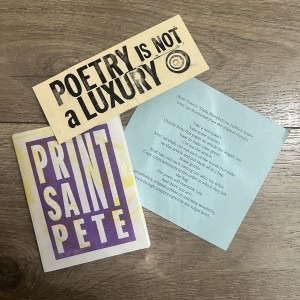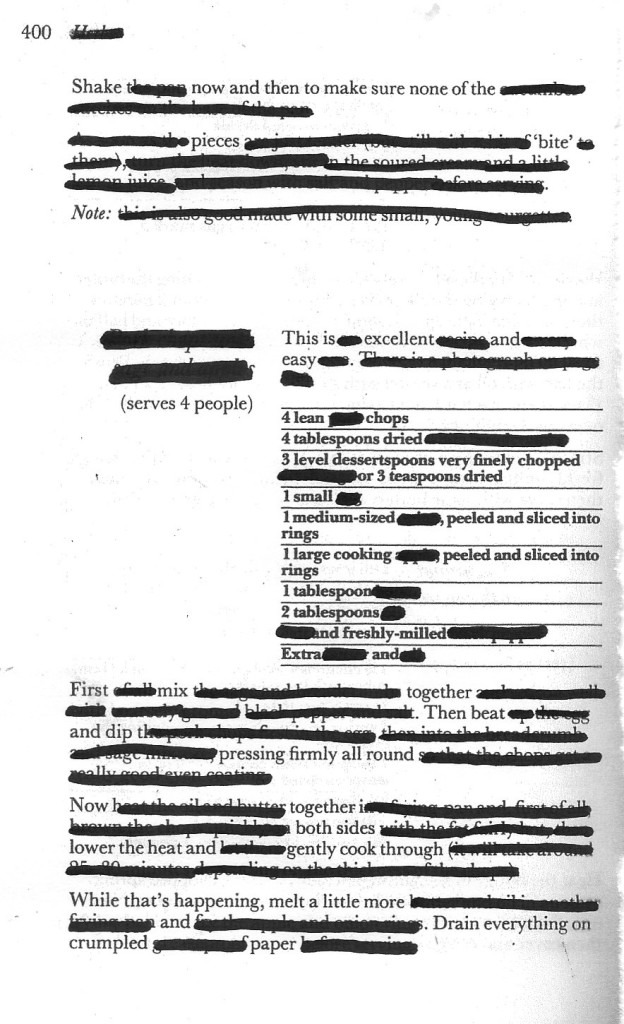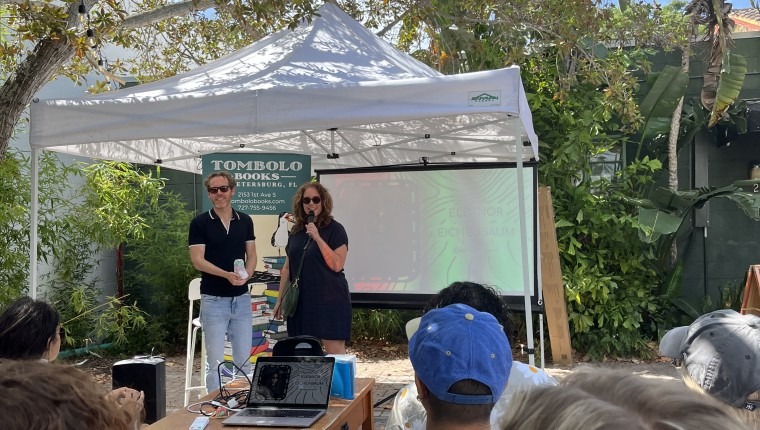We are wrapping up our Emerging Artist Grant, we’ve delivered all the work to the gallery, shared event information with interested parties, and are awaiting opening night. I am excited to see the conversations that arise from the exhibition. I’ve decided to use this article to write about a literary arts event I attended this past weekend to support fellow grantees based in St. Pete.
On Sunday, April 28th, after meeting with my mentor for a quick chat I headed over to the bricked courtyard of Tombolo Books for “Experimental Poetry and Collaboration.” Part of the City of Writers Poetry Festival, this outdoor event was orchestrated by St. Pete Poet Laureate Gloria Muñoz with several presenting partners. The weather was perfect, the seats were all filled as we sat under a sea grape tree and listened to 5 poets/visual artists talk about their work.
The first speaker Eleanor Eichenbaum spoke about erasure in poetry and the questions that one should ask oneself when taking an original text and altering it to create dialogue. What historical powers are at play and are you subverting or reinforcing them? Amongst other works she shared Jen Bervin’s “Nets,” a book created within a palimpsest of Shakespeare’s sonnets, as well as some of her white-out erasure poems and visual art using privacy envelopes.
Tyler Gillespie spoke about the impact collaboration has on his ability to remediate his poetry and move it from the page into public spaces. A large poetry sculpture made from papier mache was adorned with Florida statutes and bills, AI-generated text, Julia Child recipes, and birds. Attendees were encouraged to grab thick Sharpies and redact sections turning this piece into a collaborative erasure poetry sculpture.
The third speaker Kaitlin, from Print St Pete, invited us to print bookmarks and posters, and shared the work of Audre Lorde “Poetry is Not a Luxury”. Kaitlin read us the following:

“The quality of light by which we scrutinize our lives has direct bearing upon the product which we live, and upon the changes which we hope to bring about through those lives. It is within this light that we form those ideas by which we pursue our magic and make it realized. This is poetry as illumination, for it is through poetry that we give name to those ideas which are, until the poem, nameless and formless-about to be birthed, but already felt. That distillation of experience from which true poetry springs births thought as dream births concept, as feeling births idea, as knowledge births (precedes) understanding….
If what we need to dream, to move our spirits most deeply and directly toward and through promise, is a luxury, then we have given up the core-the fountain-of our power, our womanness; we have given up the future of our worlds. For there are no new ideas. There are only new ways of making them felt, of examining what our ideas really mean (feel like) on Sunday morning at 7 AM, after brunch, during wild love, making war, giving birth; while we suffer the old longings, battle the old warnings and fears of being silent and impotent and alone, while tasting our new possibilities and strengths.”
Kaitlin also invited participants to take home a poetry project by following the instructions from Tzara’s “Dada Manifesto on Feeble & Bitter Love” (as translated from the original French).
The fourth speaker, Camilo Loaiza Bonilla, shared a brief history on collage used in visual art and presented the poem, Raíces, a video collage about generational trauma and immigration. Magazines stacked on a table, attendees could write three lines of their own poems, add them to a ziploc bag, draw 3 random lines and make collage zines.

The fifth presenter encouraged us to think about outdated or what many consider obsolete forms of communication and the power of the fax machine to push political agendas while also seeing the beauty in placing printed poems on public objects such as telephone poles to bring about engaging conversations between city dwellers. Collaborators could add their words to printouts of birds to be showcased in the next installation in “Poetry Alley.”
Finally closing words by Gloria Muñoz asked the attendees to think of the ways we can use our creative voices to connect with others and create change. Always one who loves to learn, who absorbs and appreciates what others have to teach, I share with you the erasure poem I experimented with once I returned home. Thanks to all involved for inviting others to explore new medium and open our hearts and minds.




